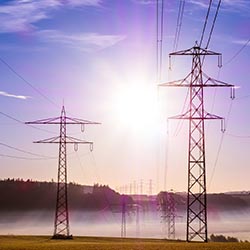Energy Deregulation 101

Before Energy Deregulation
Originally, states were divided into regions by the Federal Energy Regulatory Commission (FERC) in which a single utility company was given exclusive rights over the supply and delivery of energy.
Gas and electric energy companies owned the delivery infrastructure (i.e., pipes and wires) used to transport natural gas and electricity to a customer’s home or business. Many electric energy utilities also owned the facilities used to generate electricity.
Because natural gas and electricity energy were both supplied and delivered by the local utility company, the local utility had an energy monopoly over the area it serviced. When a company has a monopoly, other companies cannot compete for the same business.
In the mid-1990s the FERC made a decision to deregulate the energy industry, which allowed individual states the authority to create competition for the supply market within their states and were given the authority to decide whether or not to participate in deregulation.
In states that elected to deregulate, most electric utility companies made the decision to sell off their generation facilities to third party companies, which meant they no longer had an stake in the supply end of the business, this includes (Include States here)
Energy Deregulation Today
In deregulated states, only the supply end of the energy business is open to competition, which means customers now have the option of choosing the power company that purchases the natural gas and/or electricity that their utility delivers to them. That means customers are no longer stuck with one option; they can “shop-around” for energy supply companies that offer products and services that meet their specific needs.
Because utility companies continue to own the delivery infrastructure, a complex physical network of pipes and wires through which natural gas and electricity power is transported, it is not possible create competition for the delivery end of the business. Only the local utility company is able to deliver natural gas and electricity to a customer.
Companies that compete for the supply market are commonly known as alternate or third-party suppliers; however, many states have their own terminology to refer to such companies.
Roles and Responsibilities of Utilities and Suppliers
In order to be permitted to sell natural gas and/or electricity in a deregulated market, North American Power must be licensed or approved to do business in that area.
A customer who wishes to choose an alternate energy supplier must meet certain enrollment criteria and go through an enrollment process.
Once a customer is successfully enrolled with an alternate supplier, the alternate supplier will begin supplying natural gas and/or electricity to the customer via the utility company’s infrastructure.
Following a customer’s switch to an alternate supplier, the utility company will continue to:
Service and maintain the delivery infrastructure, which consists of:
- Natural gas pipelines
- Electric wires and poles
- Read and maintain the gas and/or electricity meters at the customer’s home or business
- Respond to energy emergencies, e.g., outages, leaks, etc.
When a customer chooses an alternate energy supplier, the utility will, in most cases, continue to send the customer one bill, which includes the supplier’s charges and the utility’s delivery charges.
Operational Differences Between Utilities and Suppliers
- In many areas, the utility company will continue to supply natural gas and electricity to customers who have not chosen an alternate supplier.
- A utility company that supplies natural gas and/or electricity either by default or at the customer’s choice, typically does not profit from the sale of that supply, only the delivery of it.
- Because utility companies do not profit from the sale of energy supply, many encourage their customers to choose an alternate supplier.
- When a utility company serves as a customer’s supplier, they are required to charge that customer the exact cost they incurred to obtain that supply.
- As a result, the utility companies’ supply rates are always reflective of market prices, and they are limited as to the types of rate plans they are able to offer.
- In some states, customers are required to choose an alternate energy supplier and if they neglect to do so, they are assigned one.
- Unlike utility companies, alternate energy suppliers are able to purchase natural gas and electricity off the wholesale market whenever they choose. By contrast, utility companies are only permitted to purchase natural gas and electricity for their customers at designated times throughout the year.
- Unlike utility companies, alternate energy suppliers’ rates are not regulated by the state commission, which give them flexibility to offer customers a variety of products and services at competitive rates.
- Alternative energy suppliers are able to make a profit from the sale of natural gas and electricity because unlike the utility company, they are able to set their own prices.










